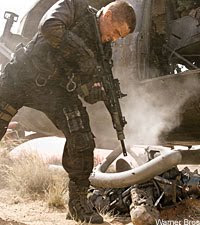.png) In the autumn of 1883, H.G. Wells enrolled into the Royal College of Science in South Kensington, London. Previously enrolled in what he considered simplistic trade schools, this was Wells's first outing into academia. A year later, Wells became a student of biology under Thomas Henry Huxley, renowned Darwinist and rabid supporter of his own mentor, Charles Darwin. Undoubtedly, being a student under Huxley played a role in Wells's own science fiction works. In War of the Worlds, it enabled him to give almost lab-report like summaries and descriptions of Martian biology and behavior. However, beyond just giving Wells an edge on the description of his own inventions, Huxley's ravenous belief in Darwinism inflicted upon Wells a deep sense of the process of natural selection. The 19th century was also the era of social Darwinism, in which Darwin's principle of natural selection was pressed upon members of society in a "survival of the fittest man". According to this belief, those who were strong minded and strong willed were destined to rise above the destitute and ill-willed. This sense of social Darwinism pervades within War of the Worlds, pushing Wells's writing beyond simple scientific descriptions of natural selection into realms of social Darwinistic acts befalling characters. Within his writing, one primary characters display Wells's application of natural selection to humanity: the curate.
In the autumn of 1883, H.G. Wells enrolled into the Royal College of Science in South Kensington, London. Previously enrolled in what he considered simplistic trade schools, this was Wells's first outing into academia. A year later, Wells became a student of biology under Thomas Henry Huxley, renowned Darwinist and rabid supporter of his own mentor, Charles Darwin. Undoubtedly, being a student under Huxley played a role in Wells's own science fiction works. In War of the Worlds, it enabled him to give almost lab-report like summaries and descriptions of Martian biology and behavior. However, beyond just giving Wells an edge on the description of his own inventions, Huxley's ravenous belief in Darwinism inflicted upon Wells a deep sense of the process of natural selection. The 19th century was also the era of social Darwinism, in which Darwin's principle of natural selection was pressed upon members of society in a "survival of the fittest man". According to this belief, those who were strong minded and strong willed were destined to rise above the destitute and ill-willed. This sense of social Darwinism pervades within War of the Worlds, pushing Wells's writing beyond simple scientific descriptions of natural selection into realms of social Darwinistic acts befalling characters. Within his writing, one primary characters display Wells's application of natural selection to humanity: the curate.The Curate
The curate within Wells's world presents a look into Wells's interpretation of religion. While in general a vague character (we never really find out any details as to his exact position in pre-Martian English society), the narrator spends a great deal of the book living alongside the curate. First impressions for the narrator do not go well - the curate cannot hold his own in the world, and makes no effort to sustain himself against the Martians. The narrator takes it upon himself to rescue the curate from the roadside, but is quickly trapped for 2 weeks with the man when the fifth cylinder crashes in the vicinity of the house they hide within. During this time the curate suffers wild mood swings, between claims that God has forsaken humanity, to arguing about the little food left within the house for them to share (often hoarding the food and exponentially over-eating). For all intents and purposes, the reader is made away that during this period, the curate stays alive only due to the actions of the narrator. But the narrator is hardly benevolent. The narrator is not ignorant of these harsh actions - in fact, he calls upon the reader to forgive his rash behavior and struggles with the curate. As the weeks go by, the narrator finds himself getting into physical conflict with the curate. Perhaps these physical tests of strength between the two characters is one of the clearest examples of Wells's writings reflecting social Darwinism. Just as two animals fight over food and survival against the greater threat of predators, so does the narrator and the curate wrestle one another to exhaustion. The fighting between the two characters culminates eventually in the narrator's attempted murder of the curate with the hilt of a kitchen knife, thwarted at the last second by the abduction of the curate by the neighboring Martians. While the narrator did treat the curate harshly, Wells clearly exposes the narrator as the stronger willed and stronger built of the two men. In essence, the lack of consequences against the narrator, and in fact his continued survival, seems almost a implicit endorsement of the narrator's prowess, and therefore, an endorsement of the process of natural selection applied to man.



